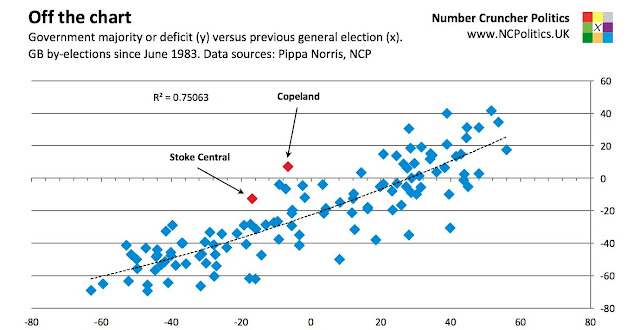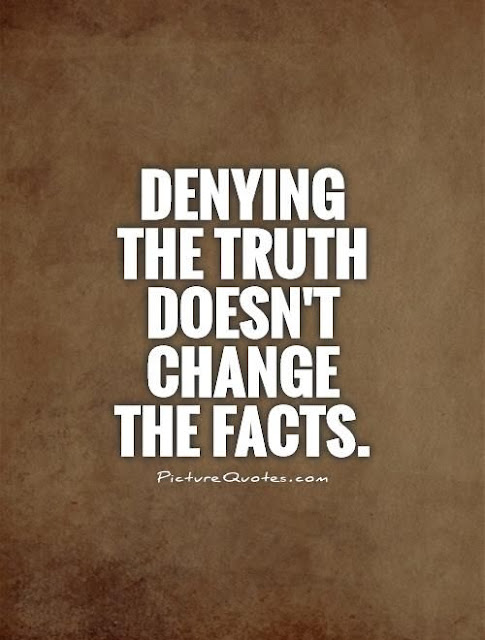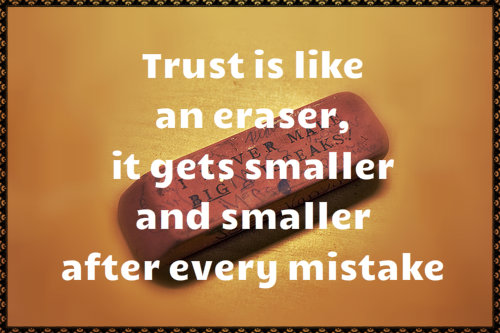Posts
Showing posts from February, 2018
The right and wrong way to respond to Labour
- Get link
- Other Apps
It is right and legitimate that in the debate about what future Britain should follow, people should have the right to make constructive criticism of the parties and policies they don't support as well as advocating those they do. However, the result of the 2017 general election stands as a dire warning of what can happen if you give the impression of spending too much time trashing your opponents and not enough time putting forward clearly set out positive policies of your own. Anyone who imagines that the Conservatives can win the next election through a campaign which mainly consists of Corbyn-bashing should read " Time has let Corbyn off the hook ," an excellent article by Andrew Stuttaford which explains why a attitudes and a history which would once have made Jeremy Corbyn unelectable outside the most loyal of Labour heartlands - and still do make him unelectable in some areas which used to be Labour heartlands, such as the constituency where I live, which n
Working Together meeting this evening cancelled
- Get link
- Other Apps
Snow, Earthquake, school closures
- Get link
- Other Apps
There is snow on the ground in many parts of Cumbria including the West Coast - I've lived in Whitehaven for twelve years and can count on the fingers of my two hands how many times we have had more than trivial amounts of snow settle but that count has just incremented. More than a hundred schools in Cumbria are closed today because of snow and access issues, the current list is available to read at: https://www.cumbria.gov.uk/school_closures/ (No point quoting an exact number as it may well change through the day.) There was also what seemed like a small earth tremor or minor earthquake at about 7.35 am this morning. My daughter and her friends have been exchanging messages and it has been felt all over West Cumbria at least as far as Cockermouth and Gosforth as well as Whitehaven - I have also seen it mentioned on social media. I am told the British Geological Survey has a mention. Earthquake Update : BGS has it as a 3.2 magnitude quake centred at Mosser in Cumbria and
The Brexit culture war continues ...
- Get link
- Other Apps
As a reminder of where I am coming from before discussing the ongoing Brexit argument ... I agonised for a long time during the EU referendum campaign about which way was in Britain's best interests before eventually voting Remain. If I was sent back in some kind of time warp to the day I filled out my postal ballot I would still vote Remain. The events of the past 20 months have demonstrated that, just as I argued at the time, both campaigns were right on some things but wrong on many others and both were grossly overstating their respective cases. Add up the issues on which the Remain narrative appears to fit what has happened so far and those on which the Leave narrative has, and there is enough on both sides of the ledger that it isn't actually surprising that not too many people have changed their minds. (Of course, one of the things about which hardliners on both sides are selective in the evidence they notice in opposite directions is that, while opinion polls ha
"Saturday Chataway" to meet your elected representatives in Keswick on Saturday
- Get link
- Other Apps

Trudy Harrison MP is organising "Saturday Chataway" sessions around the Copeland constituency and the next one is this coming Saturday 3rd March at the Crosthwaite rooms in Keswick from 10am to 12 noon. Councillors of all levels and from all parties have been invited and we are expecting a reasonable representation of elected members.
The big freeze begins
- Get link
- Other Apps
The Met Office predictions of a very severe cold spell this week do appear to be coming true. There is ice and snow on the ground in many parts of Cumbria including the West Coast which usually sees much less snow than the rest of the county. Just to add to the risk, local systems of weather mean that in a comparatively short journey along the West Coast this morning it was possible to start in an area where there was frost and settled snow, drive through an area where there was no obvious sign of either, and then within a few more miles arrive where the snow and ice on the road was much worse. So if you are either driving, or walking around outside this morning (and probably for several days to come) do take great care.
Health Scrutiny and the "Five Hard Truths"
- Get link
- Other Apps
I spent much of today at the Cumbria Health Scrutiny meeting in Carlisle. I will have more to write this week about what was an extremely interesting meeting, for which the full agenda including reports is available here . As a taster, here are what the Morecombe Bay NHS (covering an area which includes South Cumbria and part of Lancashire) describes as "The five hard truths" which they are seeking to address and about which they have started a process of "public engagement." (They are not, incidentally, at this stage making any definitive proposals to deal with this and do not expect to put forward any service closures or redundancies when they do put such proposals forward.) "The five hard truths are: 1. Too much of the NHS budget is now spent on treating a number of health conditions that are largely preventable and some of these issues lie outside the NHS. We are spending on ‘cure’ and ‘follow up’ rather than prevention. 2. Despite a
Sunday music spot: "Salvator Mundi" by Thomas Tallis
- Get link
- Other Apps
Lyrics Salvator mundi, salva nos, qui per crucem et sanguinem redemisti nos. Auxiliare nobis, te deprecamur, Deus noster. Translation: O saviour of the World, save us, who by thy cross and blood hast redeemed us. Come to our rescue, we beseech thee, our God. This recording is of a performance by "The Sixteen."
Saturday music spot: "Rejoice greatly" (Handel)
- Get link
- Other Apps
Remembering the Copeland by-election and the daft explanations put foward ...
- Get link
- Other Apps
In the week or so after the Copeland by-election there were a large number of barking mad explanations put forward which are still funny a year later. Even the Daily Mirror was laughing at Baroness Shami Chakrabarti, Paul Mason, and other Corbyn apologists over these delusional attempts to shift the blame to anyone other than the Labour leadership. Here is an extract from another of my posts from a year ago ... "Supporters of Jeremy Corbyn have blamed just about everyone on the planet for Labour's disastrous showing in the by-election except Jeremy Corbyn. I'm sharing links to some of the most absurd not because I wish to gloat - well not much anyway - but because I think even disappointed Labour supporters, if they have a working brain and are not members of the Cult of Corbyn, will find some of them quite funny. A strong contender for the most barking mad article on the subject is a piece by Paul Mason called " Labour won Stoke Jamie Reed lost Copeland .&
Remembering Copeland one year on: how remarkable was that result
- Get link
- Other Apps

Here is the text of an article I posted exactly one year ago on just how remarkable the Copeland result was. "Apologies, this post is for those with an 'anorak' interest in elections only. Number Cruncher Politics just tweeted this chart which shows how the majority by which governing parties won or lost by-elections changed compared with the previous general election. Government gains are in the top left of the chart, above and to the left of the "Origin" where the two Zero lines intersect: the Copeland by-election is the only result in this quadrant since 1983. Government holds are results in the top right, above and to the right of the Origin. A government hold with an increased majority would be in that quadrant and above a line going up from left right at 45 degrees from the origin - which has not happened since 1983. Opposition holds - or seat changes between opposition parties - are in the bottom left hand quadrant and by-elections where th
Quote of the day 24 Feb 2018 - a year after Trudy Harrison's historic Copeland victory
- Get link
- Other Apps
“ It has been very clear talking to people throughout this campaign that Jeremy Corbyn doesn't represent them .” “They want a party which is on the side of ordinary working people, which will respect the way they voted in the referendum and which will build a country that represents everyone .” “That's why they voted for me.” ( Trudy Harrison MP , extract from her victory speech after winning the Copeland by-election one year ago in what the Labour-supporting Daily Mirror described as " A devastating result for Labour ." The paper added " The Tories have become the first party of Government to win a by-election from the Opposition for more than three decades." "Conservative candidate Trudy Harrison, 40, pulled off a sensational triumph in the crunch Copeland poll in Cumbria, triggered by the resignation of Labour MP Jamie Reed." "The bombshell result, with a majority of 2,147, is a devastating defeat for Jeremy Corbyn.
Whitehaven Town Council - debate on security measures
- Get link
- Other Apps
In May this year I will pass the milestone of 25 years' experience as a councillor on various authorities; and over that quarter-century I can count on the fingers of one hand the number of occasions where a reasonable person might have felt themselves unsafe or threatened in the position I found myself while carrying out council duties or related to them. The number of occasions where there was a need for a police or security presence even on a precautionary basis (other than when they were the people we were meeting to discuss police issues!) at council meetings was likewise very rare. This week I have attended a number of council meetings and after one of them went on to a meeting with non councillors. They made - in a gently mocking way rather than a nasty one - a number of jokes about councillors needing pepper spray and baseball bats and I didn't have a clue what they were on about. Then on the way home I picked up this week's Whitehaven News and read this . I s
Protecting press freedom
- Get link
- Other Apps

As the debate about the media in Britain intensifies, our country needs to decide the answer to this question. Do we want to have a free press and accept that they will sometimes get it wrong, or do we want to have tight regulation in the hope of tackling press abuses and accept the risk that this will compromise the ability of the press to hold the powerful to account? A few days ago I used the following Jefferson saying as my "Quote of the Day." I had not realised how relevant it would soon come to be to this week's political debate. The last thing a society which wishes to be a fully functioning democracy can afford to do is hand government regulators more power over the newspapers. television, or social media. There have been repeated attempts in recent days by certain rich and powerful individuals, and in the House of Lords, to press for another Leveson-type inquiry and limit what the press can write. Her Majesty's Opposition has now started down the
Quote of the day 22nd February 2018
- Get link
- Other Apps
"Theresa May was right this week to call for open and transparent statements from the Labour leader. I doubt if they will come. What we will get is a steady trickle of new names and old information. And denials, of course. When they come, remember Mandy Rice-Davies." (Joe Haines, former Press Secretary to Labour prime minister Harold Wilson during the Cold War, in an article about what the KGB and other intelligence agencies from hostile foreign powers which you can read in full here .)
Midweek Madrigal: "Sing Joyfully" by Byrd, sung by VOCES8
- Get link
- Other Apps
Emergency road closure for repairs, Victoria Road Whitehaven
- Get link
- Other Apps

Victoria Road, Whitehaven has been closed today (Wednesday 21st February 2018) near the entrance to the Bay Vista estate for urgent road repairs. These works are expected to last up to five days. During this time there will be no through access for vehicles along this road from the Sunny Hill or Pelican to Scilly Bank or Quality Corner. UPDATE 22nd February The road was open again at least part of today. I will check tomorrow morning whether the work has been completed and post the answer here.
By their attitude to press freedom ye shall know them ...
- Get link
- Other Apps
There is a balance to be struck between the imperative need for a democratic society to allow free speech and giving people who have been the subject of lies and defamation to take action to protect their reputation. The press in Britain is not perfect - by God they're not - but if you ask me to name what sort of press would be worse than the one we have now I'd answer any press accountable to the government. A pretty good test of how strongly committed to democracy someone involved in politics is where they seek to strike that balance between press freedom on the one hand and regulation and restraint on the other. An indicator of how strong Britain's libel laws are compared to those elsewhere is the fact that we have had "libel tourism" in which wealthy companies or people from around the world who are trying to take legal action against criticism which they don't like tend to see if the words they object to have been published in Britain, and if so bri
Social Media crows as the sale of KCF chicken is arrested ...
- Get link
- Other Apps

I'm told police in Tower Hamlets actually had to put out a statement asking people not to call them over the shortage of chicken at Kentucky Fried Chicken as it was "not a police matter." Meanwhile on social media it was suggested that the police elsewhere had been more actively involved and that this picture showed them arresting the person responsible Someone claiming to be the South African Police Minister had previously threatened to arrest the person responsible for a KFC "Cauliflower and Kale" burger If it really was the South African Police minister it sounds like his department's resources should have been (and may soon be) better employed investigating his then (and now former) boss ...
Quote of the day 20th February 2018
- Get link
- Other Apps
"Twitter outrage rules: Rightie says something sexist - cyber-lynch. Leftie commits sexual assault - understand his journey." ( Twitter post yesterday from the Guido Fawkes website .) It does unfortunately appear that rather too many people in politics and on social media are more willing to be forgiving of someone who is alleged to have behaved, or even who has admitted behaving, in very inappropriate ways if the alleged or actual perpetrator is perceived to be on their own side of the political divide. Just to be clear, I think people are entitled to due process and to be treated as innocent until proven guilty - and applying that principle to the accused does not have to mean failing to treat victims with respect or refusing to take what they say seriously - regardless of their politics. I also think that failure to do this, especially where the accused is someone with different political views to one's own, is a problem throughout the full range of the pol
An anecdote: what's wriong with communism in one paragraph
- Get link
- Other Apps

Unfortunately this story is far more than a play on words. However noble the ideals of some of those behind the Russian Revolution, what happened was not the lifting up of poor people but the wholesale elimination of whole classes of the "privileged" which even included the killing of millions the slightly-less-unfortunate class of peasants, the "kulaks."
Sunday music spot: "If Ye Love Me" (Tallis) at Ely Cathedral
- Get link
- Other Apps
February meeting of the Cumbria Health Scrutiny Committee
- Get link
- Other Apps
The next meeting of the Cumbria Health Scrutiny Committee will held on Monday 26th February at 10.30 am at Cumbria House, Botchergate, Carlisle, and will be open to the public. After the usual boilerplate (apologies for absence, minutes of previous meeting, etc) the first major item on the agenda, item six, is the presentation of a report from the Chief Executive of the CCG (The clinical commissioning group) for North Cumbria NHS. This will include details of the 12 month trial of "Option One" Consultant-led maternity at West Cumberland Hospital as reconfigured following the 2016 Success regime consultation: HealthCare for the Future Update PDF 199 KB Report by the Chief Executive, NHS North Cumbria Clinical Commissioning Group The other main items on the morning's agenda are as follows: 7. Communications and Engagement Programme - Bay Health and Care Partners PDF 259 KB To consider a report by








